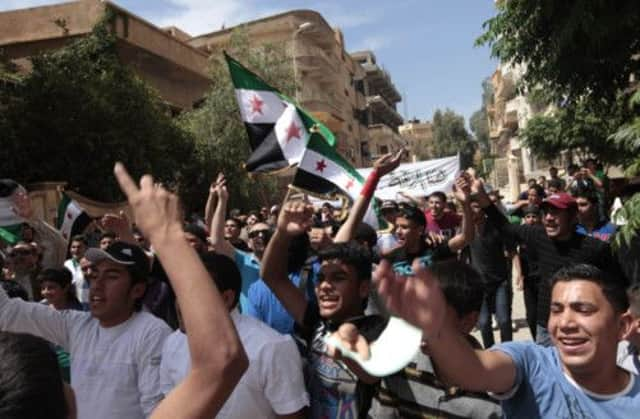Syria: ‘Civil war has cost up to £50bn’


US-educated economist, Abdullah al-Dardari, a former Syrian planning minister, is head of a six-member United Nations’ team drawing up a comprehensive post-war reconstruction plans despite the civil war there.
A push to bring together Syria’s opposition and representatives of president Bashar al-Assad’s regime to negotiate a peaceful transition has given their work new urgency.
Advertisement
Hide AdAdvertisement
Hide AdMr Dardari said Syrians had to be ready to rebuild when the fighting ends. He said his team had been overwhelmed with requests for a reconstruction plan to support the transition initiative in case it succeeds.
“I see a glimmer of hope,” he said .“There appears to be more readiness for a political compromise [within both sides].”
Earlier this month, the US and Russia agreed on a joint push to get rebel and regime representatives to negotiate a political transition in Syria. An international conference, possibly in early June, would help launch talks.
The two sides remain far apart on the terms for negotiations, with the opposition insisting Mr Assad must step down first and the regime unwilling to commit to an open-ended ceasefire. Mr Dardari’s plan – the National Agenda for the Future of Syria – is being drafted on the assumption that the conflict, now in its third year, will end by 2015 and that Syria will remain intact.
“Is that possible? If one looks at the situation today, then the immediate reaction is, ‘No, it’s not possible,”’ he said. “However, I think the human losses and the catastrophic destruction should create sufficient moral pressure on the parties of this conflict – internal and external, since this has become a proxy war – to think seriously of a political compromise.”
Syria’s vicious civil war, in which the regime has relied on air power to crush the rebels, has destroyed towns and swathes of apartment blocks. Factories, oil pipelines, schools, hospitals, mosques and churches have been destroyed. The fighting has wrecked the economy, halting oil exports and destroying industry and infrastructure.
A Sunni Muslim who served as Syria’s minister of planning for two years until Mr Assad made him deputy prime minister for economic affairs in 2005, Mr Dardari has been credited with the opening up of Syria’s economy to free market enterprise, courting foreign investors and pushing political reforms.
He quietly left government in the summer of 2011, months after the uprising erupted.
Advertisement
Hide AdAdvertisement
Hide AdSince August, he has been chief economist at the Beirut-based UN Economic and Social Commission for Western Asia, heading a team of six economists and 30 experts inside and outside Syria. He knows he faces a monumental task on reconstruction. He estimates the damage to Syria’s economy three years into the conflict at £40-£50bn. The economy has shrunk by about 35 per cent, against 6 per cent annual growth in the five years before March 2011. To rebuild 1.2 million homes, Syria needs £14.5bn, plus £4bn for utilities and other infrastructure.
“The fighting needs to stop soon, very soon, and it needs to end with a political solution that will preserve national sovereignty and territorial integrity, or there will be no reconstruction, and we’ll lose Syria as a country altogether,” he warned.